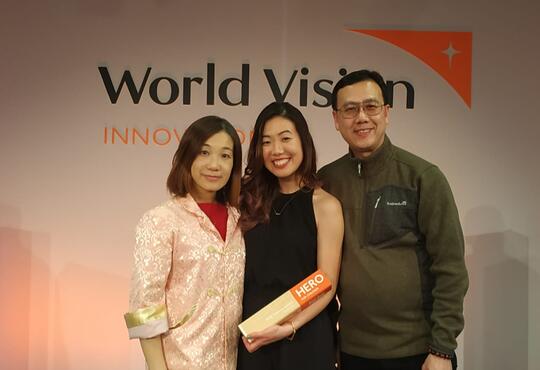We think it is important to highlight interesting stories, milestones and achievements of our alumni. If you have a suggestion for the spotlight, please let us know by email at stp.alumni@uwaterloo.ca
Alumni Spotlight
Sharleen Hoar (BSc '93)
By Landon Jennings
Sharleen Hoar lived at St. Paul’s for four years while studying Kinesiology from 1989 -1993, we recently caught up with her by phone to talk about how she found her career path and to learn about her current work with high performance athletes as a Mental Performance Consultant.
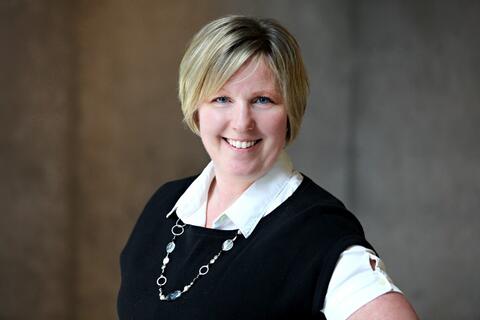 Sharleen Hoar was a competitive figure skater growing up, and dreamed of becoming a skating coach. Her father made it clear that she should pursue an undergraduate degree before going into coaching. Kinesiology fit with her career goals and Sharleen was accepted to the program at the University of Waterloo.
Sharleen Hoar was a competitive figure skater growing up, and dreamed of becoming a skating coach. Her father made it clear that she should pursue an undergraduate degree before going into coaching. Kinesiology fit with her career goals and Sharleen was accepted to the program at the University of Waterloo.
Living in West Vancouver since she was twelve years old, Sharleen’s parents were initially reluctant about sending her to Ontario, but they believed St. Paul’s would be a safe place for their daughter to live. “My fathers’ stipulation on my choice to go to Waterloo was that he got to choose where I lived, and he chose St. Paul’s! He felt it was a safe space, liked that it had an affiliation with the United Church but wasn’t ultra-religious, and that as a small residence it fit with our family values.”
Her father deserves some credit for making that choice because Sharleen ended up loving St. Paul’s so much that she stayed for four years; eventually living on every residence floor. “I remember pleading with St. Paul’s staff in my final year to let me live on the French language floor (La Bastille) because it was the only place I hadn’t experienced yet” Sharleen jokes. St. Paul's became a home away from home where Sharleen met many life-long friends with whom she shares many fond memories of their time in residence together.
During her second year at Waterloo, Sharleen realized that she did not want to pursue the lifestyle of a coach anymore. “I didn’t want to go back to the ice and then began thinking about the lifestyle…getting up early and practicing late at night”.
She knew she still wanted to work with athletes but didn’t know how until she took a sport psychology class taught by Neil Widmeyer. She recalls that he made the topic fun, and expressed that learning about “building confidence, motivation, and relaxation techniques” was much more interesting than theory.
Sharleen worked with a mental performance coach briefly when she was a skater and saw an opportunity to connect what she was learning about sports psychology with her desire to continue working with athletes. After completing her kinesiology degree and leaving her "home away from home", Sharleen pursued a master's in Applied Sports Psychology at the University of Idaho before eventually returning to her actual home in Vancouver where she completed a PhD in Sport and Exercise Psychology at UBC.
Today, Sharleen works as a Mental Performance Consultant for high-performance athletes across Canada and is the Lead of Mental Performance for the Canadian Sport Institute Pacific. She has academic and teaching appointments with both the University of Lethbridge, and the University of Victoria.
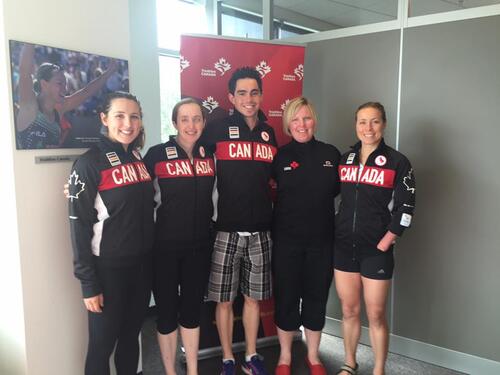 As a Mental Performance Consultant, Sharleen uses her academic and experiential knowledge to apply the concepts of sport psychology to athletes and performers. Most of her days are spent having conversations with Olympians/Paralympians and aspiring Olympians/Paralympians and the coaches and sport science staff who work together in support of elite Canadian athletes.
As a Mental Performance Consultant, Sharleen uses her academic and experiential knowledge to apply the concepts of sport psychology to athletes and performers. Most of her days are spent having conversations with Olympians/Paralympians and aspiring Olympians/Paralympians and the coaches and sport science staff who work together in support of elite Canadian athletes.
Using tools like meditation, stress management techniques, communication skills and mental imagery exercises, Sharleen develops individualized programs for athletes. She also designs workshops and webinars about motivation, resiliency, and emotional control.
As the Lead, Mental Performance for the Canadian Sport Institute specific, she works with a team of consultants to deliver a suite of world-class services, with the ultimate goal of putting more athletes on the podium.
We asked about how working with a team or youth athletes might differ from working with an Olympian or Paralympian, Sharleen says “they all want to be the best”. But, elite athletes, even those who have reached the peak of their sport can struggle with negative self-talk, motivation, time-management, and self-confidence.
Context is where she sees the biggest differences. “Preparation to be an Olympian or Paralympian is much different than U-Sport. [For Olympic and Paralympic hopefuls] the sport becomes much more who they are, their identity as opposed to part of an exploration.”
When Sharleen first began working with Olympic and Paralympic hopefuls this context changed how she developed programming, as traditional mental training like goal setting was not what they needed help with. “I realized that these athletes needed help with managing complex relationships, being away from home, and navigating performance on demand”. With this new context Sharleen had to learn through research to develop the best tools to best support these individuals.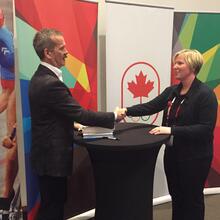
Reaching the top of her profession has not been an easy road, it took a lot of hard work, networking, and mental toughness to get to where she is today. While working with her first elite team, the Cross-country ski team based out of Canmore, AB, Steve Norris, the director of WinSport at the time, called upon her in a meeting and said: “what are you prepared to do to become world-leading?”. She was shocked at the question but then realized that Olympians, just like her, “have to put on their pants one leg at a time but they have learned to move their bodies and push their spirits in extraordinary ways”.
Sharleen too, had to work hard, persevere, and go beyond but now she gets to march alongside many extraordinary people and take satisfaction knowing that she helped them reach the top.
Alumni Spotlight
Jason Panda (BA '01)
By Sarah Ghandour
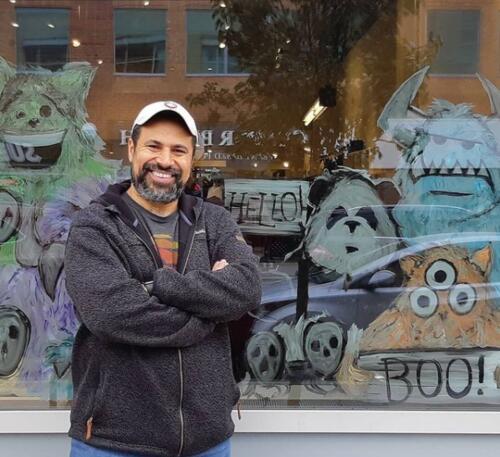 As the son of a nuclear physicist father and an artist-teacher mother, there was no doubt Jason Panda was going to have a unique impact on the world.
As the son of a nuclear physicist father and an artist-teacher mother, there was no doubt Jason Panda was going to have a unique impact on the world.
When Jason arrived at St. Paul’s, he started his studies in Waterloo’s computer science program with hopes to pursue computer graphics and movie making, but soon realized spending time in front of a computer screen wasn’t what he pictured himself doing for the rest of his life. After many program changes, he finally landed on a joint mathematics and fine arts degree. While a rare combination, he shared that both fields of study have a common thread around which he’s built his career: problem solving.
Jason lived at St. Paul’s for four years and was a very active member of the community from the beginning. He was a student representative on the Board of Governors, was a frosh coordinator and a Don, he even met his future wife in third year. Some of his fondest memories involve meeting new students every term and participating in College traditions such as Blackforest Coffeehouse, toast time and movie nights.
“I really valued the community I was part of at St. Paul’s,” said Panda. “It taught me a lot about myself. As a Don, I learned how to work with so many different people and it helped me realize I wanted to work with people throughout my career.”
After leaving St. Paul's and Waterloo, he gained a Bachelor of Education from Brock University, turning his passion for people and problem-solving into a teaching career. As a visual arts teacher for Kitchener-Waterloo Collegiate and Vocational School, he encourages his students to problem solve, to discuss and critique their artistic work, employing skills he valued from university classes.
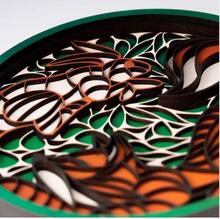
Outside of the classroom, he undertakes many community-based arts initiatives under the name KW Panda. Some of these include, designing community murals, teaching photography and supporting others with graphic design solutions. One venture was a project called Imagine A Show, an annual photography initiative giving youth the opportunity to learn, explore and submit photos to a collection and have their work displayed in galleries across the Waterloo region.
“This opportunity gave kids the rare opportunity to share and showcase their work early in life,” said Panda. “It allowed them to learn their work is valuable, which is something I’m very proud of.”
In 2017, Jason's passion for problem solving truly manifested when he co-founded Complex Rooms, a business focusing on puzzles and escape rooms. He loved the idea of bringing people together to create memorable experiences through solving problems. His father taught him about logical problem solving, while his mother taught him about creative problem solving. These skills paired with his experiences as a teacher made building escape rooms a natural extension from what he does in the classroom and how he interacts with learners. As a teacher, he doesn’t believe in directing students towards a specific answer. Instead, he tries to create a safe environment for learning and encourages design thinking with rich problems worth solving.
Like millions of Canadians, the COVID-19 pandemic has greatly impacted Jason’s work, both in his classroom and in his escape rooms. He’s now teaching Visual Arts virtually and, with his business partner Jeffrey, they have expanded Complex Rooms to include portable escape boxes and online games, which allow people to have similar experiences from the comfort of home.
“While this is not what we saw for the trajectory of the business,” said Panda “I’m very proud of the new games we’ve built and it’s just one more problem we’ve had to solve!”.
Jason is certainly a man of many talents and accomplishments, we can’t wait to see what he does next!





